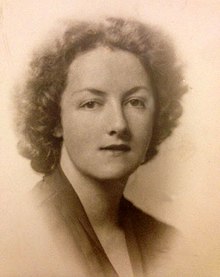This article has multiple issues. Please help improve it or discuss these issues on the talk page. (Learn how and when to remove these messages)
|
| Frances E. Williams | |
|---|---|
 | |
| Born | 1904 Waunfawr, Caernarvonshire, Wales |
| Died | 1978 |
| Occupation |
|
| Spouse |
Hugh Eric Davies (m. 1932) |
Frances Williams (1904 – 1978) was a composer and conductor, particularly known for her choral works. She was born in Waunfawr in Caernarvonshire, Wales. In 1913, she emigrated to the United States with her family who settled in Seattle, Washington.
Biography
Born Elizabeth "Lizzie" Frances Williams to parents Richard R Williams 1881-1927 and Katherine "Kate" Wright née Owen 1884-1963. She was educated at the Cornish School of Music in Seattle, where she studied with Calvin Brainard Cady and Anna Brant Dall; holding scholarships in piano and in composition. She proceeded to Juilliard Graduate School, where she held fellowships in composition with Rubin Goldmark and in piano with James Friskin. She went on to have a career as a composer and conductor. She was a member of the National Association of Composers and of the Board of Governors of The Musicians' Club of New York.
Williams married Hugh Eric Davies 1905-1984 on March 26, 1932, in New York, but continued to use her maiden name professionally.
Works
Williams was the composer of many published works, but she is best known for her setting for SATB and piano of words by Marjorie Elliott, 'Let there be music'. Other works include 'To the Dawn' for festival chorus with orchestra, 'Night' for women's voices, 'Step Lightly o'er the Hallows' (for men and women's voices), 'Praise the Lord, ye Heavens Adore Him', satb accompanied (1956), 'The Day thou gavest', satb a capella (1951), 'Be thou exalted O God' (Pss 57, 11, 66, 4, 8, 9) (1950) and 'Holy Lord of All' (Welsh Chorale) TTBB.
She was a frequent conductor at Cymanfaoedd Canu (Welsh hymn-singing festivals) in the United States, including both sessions at the National Gymanfa Ganu held in Chicago in 1972. In 1961 she was awarded the Hopkins Medal of the St. David’s Society of the State of New York for her distinguished contributions to music. She was a member of Cymdeithas Emynau Cymru (Welsh Hymn Society) and contributed a number of reviews to its Journal. She was appointed by the WNGGA (Welsh National Gymanfa Ganu Association) as Chair of the editorial committee for its Jubilee Edition of the WNGGA Hymnal, which was published in 1979, but she died before this task was completed.
References
- Charles Eugene Claghorn (1 January 1996). Women Composers and Songwriters: A Concise Biographical Dictionary. Scarecrow Press. pp. 236-7. ISBN 978-0-8108-3130-8.
- History of the Welsh National Gymanfa Ganu Association, 1929 - 2003: Col. Alfred J. Reese. WNGGA Hartland MI (2004) p394
- Composers of Wales : Frances Williams Ninnau Vol 38 #5 Sept/Oct 2013 p13
- Frances Davies in the U.S., Social Security Death Index, 1935-2014